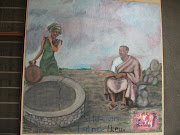Reflection on Session Two.
This section of the course looks at humanity or human person as a key concern of practical theology. How can one understand the Shoa or the genocide? How should human beings relate to each other? What and who defines a human being a person? What does God has to say about who we are and how we have to live? The text denounces the fact that some human persons are considered as “non-persons”, a nobody. Our relationships have become those of the master and slave, subject and object. There is no respect of the human being.
And it seems, like the text states, that the “Valladolid Controversy” is still playing out today. This trial is still playing out as the G8 gather to decide whether the poor and the immigrants are human persons with full right to decent life or not. It was playing out when the Supreme Court was deciding whether Terri Schiavo should live or not, whether she was a vegetable or a human being. It is still playing out when someone somewhere is condemned to death penalty; when a fetus is being aborted. This trial is still playing today as we are debating whether homosexuals deserve a human existence or not. Thus, this “dehumanization” (Gabriel Marcel) is “a kind of degradation [and] a pulverization of the fundamental uniqueness of each human person [that call us to consider] a metaphysical [and biblical] ‘recapitulation’ of the inviolable mystery of the [human] person”. (John Paul II). This seems the path that text follows to give an answer from contemporary philosophy and biblical sources.
Philosophically, the human person is unique, precious, new, and unrepeatable; the human person is free and conscious. Even twins who look very much alike are two different persons. A person is one who interrupts me; whose revelation and irruption in my existence call forth respect, contemplation, transcendence, and love. A human person is one whose existence and uniqueness reveal me as a human person as well. As Buber states, human existence is not a monologue –which is selfishness and manipulation- but rather a dialogue. Dialogue is an interpersonal encounter we mutually and reciprocally respect and affirm each other’s personhood. In dialogue, the divine presence in each human person and in the world is nurtured and actualized (Richard P. McBrien). Since God is the one who sends, he sends the other in my existence as other to remind me of his divine otherness. Thus, “divinitas can never be separated from humanitas”.
As Saint John says, the love of God can never be separated from the love of the neighbor. For the biblical perspective, human person is created in the image and likeness of God to live in communion with other creatures and with God. Thus a human person is a mystery and God is the source of human dignity. God is the I am Who Am, the one that cannot not be given; he is total mystery. And the human person, who participates in the mystery of God, cannot be named by any fellow humans. Only God can give a name to a human person, imago Dei. Everyone is equal in the presence of God, but he has a personal relationship with each one of us. Especially, God cares for the “non-persons”, the poor, the oppressed, the widow and the orphan. God’s vision for humanity is completed in Christ, who became human so that we may become divine. In his person, Christ showed that humanitas and divinitas are intrinsically related. Thus, patristic theology defined the Trinity as the communio personarum signaling the uniqueness of each of the divine persons. Therefore, we, as church, have the mission of defending and protecting human personhood against all kinds of evils and of promoting it as our unconditional way to God. The glory of God says Irenaeus, is the living human person.
This text seems to argue against racism, discriminations, sexism, and any other forms of dehumanization. The text calls to respect and promote the dignity and uniqueness of the human person as way to God. Genocide, holocaust, oppression, etc are against God’s vision for humanity. Pastorally, the text gives the foundations of human inviolable rights, such as the right to decent life; freedom of conscience, development, and etc. whatever is genuinely human is not alien to the Kingdom of God. Promoting the values of the Kingdom means being at the service of human person’s deepest desires. Our communities should be places where people find meaning to life; they can grow and develop themselves. Also, the church, sacrament of the Holy Trinity, should take a prophetic stance in today’s world in denouncing social and cultural sins that oppress the human person; in distancing itself from colonization, and imperialism; and in proclaiming –and witnessing to- the Gospel that says the Sabbath is for man/woman, not man/woman for the Sabbath.
However, the text does not answer the pressing questions of our postmodern world: when does personhood begin? Is a fetus a full human person like an adult? Or does a human person have the right to take his/her life or another human person’s life –even for a greater good? Such questions about human life call forth a reflection on abortion, contraception, stem cell research, euthanasia, death penalty, just war and legitimate defense…
In conclusion, the dignity of the human person as unique image of God is the agenda of the ministry of the church, and one of the two core features of the Kingdom of God –the other one being the transcendence of God. The Kingdom of God is about communion with God and the neighbor; especially those dehumanized who need to recover their humanity in Christ. It is in solidarity with those suffering human oppression that we follow Christ and realize God vision for us.
Subscribe to:
Post Comments (Atom)



No comments:
Post a Comment